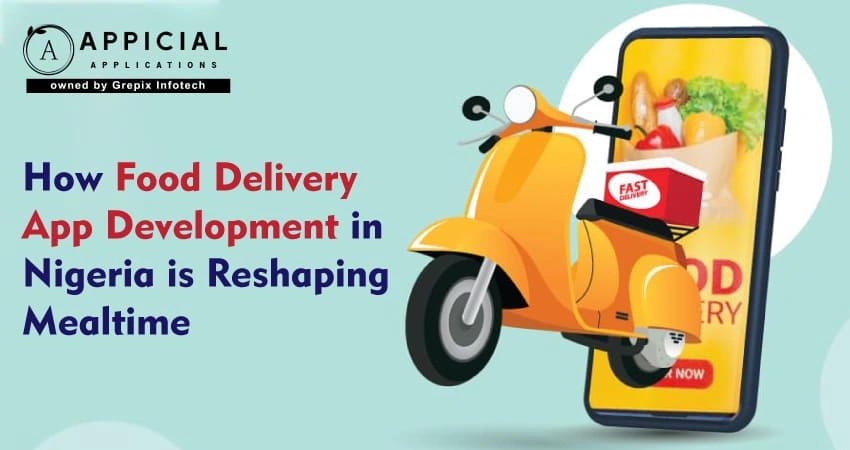
How Food Delivery App Development in Nigeria is Reshaping Mealtime
It's a normal Lagos morning. Warmth spills over yellow buses full of drowsy faces as the sun rises early. As they wave bread and Milo sachets to workers hurrying by, street vendors shout out. Nigerians have always connected through food. However, making time to eat healthily feels like a luxury these days.
Before leaving for work, a mother in Surulere rushes to drop her children off at school. After spending hours stuck in traffic, a young professional in Lekki is too exhausted to cook when she gets home. Exams that require them to stay up late in the library even affect students in Ibadan.
However, food ordering apps are now taking over, offering comfort in the form of hot, peppery jollof, amala with ewedu, or soft, spicy suya that is delivered right to your door. After a few taps, a rider emerges and hands over a warm pack of food, which is a tiny reprieve during a busy day.
This is how meal delivery tech is slowly weaving itself into daily life in Nigeria. It’s not just about convenience. It’s about giving people a chance to eat well while handling their daily hustle.
For restaurant owners, from the buka in Yaba to the grill spot in Garki, these restaurant app solutions open up a world of new customers they could never reach before. For riders, each delivery is more than a job; it’s a way to earn and provide for their families.
This isn’t a trend that will fade away. It’s a shift in how Nigerians are taking charge of mealtime.
Food delivery apps are subtly altering how people eat all over Nigeria, from the congested streets of Lagos to the peaceful alleys of Ibadan. They are allowing students to enjoy their favorite meals even during late-night study sessions, providing exhausted parents with a respite from the kitchen, and assisting busy workers in grabbing a hot meal during hectic days. No more battling traffic or standing in long lines just to get lunch. People can now enjoy comforting, fresh meals with just a few taps, free from the stress that often accompanies daily life. In this guide, we dive into why now is the perfect time to invest in food delivery app development in Nigeria. We’ll walk you through the features your app needs to stand out, the real challenges you should prepare for, and what it truly costs to build an app that people will trust and use every day. And suppose you’re serious about launching a delivery app that doesn’t just function but thrives. In that case, we’ll also show you how Appicial Applications can help you build a seamless, reliable, and profitable food delivery system that fits perfectly into how Nigerians live and eat today.
Why Invest in Food Delivery App Development in Nigeria
Nigeria is young. Most people are under 30, with energy and dreams bigger than the traffic they fight daily. Everyone is looking for ways to save time and still live well.
A mobile app for food delivery solves a real problem here. You give people a way to skip traffic queues and long wait times at eateries. You help busy parents, office workers, and students eat what they love without stress.
People already trust apps to move around, shop, and pay bills. Adding food to that mix is natural. And with mobile payment options becoming common, paying for meals online is no longer strange.
For restaurant owners, these apps are a lifeline. They don’t need to open another physical branch to grow. With food ordering apps, they can reach customers across the city, even while working from a small kitchen.
Investing now isn’t just smart. It means you’re building something people actually need.
Must-Have Features for a Food Delivery App
If you want your food delivery app development to succeed, your app should feel easy for customers but powerful enough for restaurant owners and riders.
For Customers:
- Easy sign-up with phone or email.
- Clean, simple browsing to find meals or restaurants.
- Real-time tracking to know when the food will arrive.
- Different payment methods: cards, transfer, or wallet.
- Notifications for discounts and delivery updates.
- A way to chat or call support if needed.
For Restaurants:
- A dashboard to manage orders and menus easily.
- A way to add photos, update prices, and see what meals are selling best.
- Access to customer reviews for feedback.
For Riders:
- A clear system to see orders and delivery addresses.
- Map navigation to avoid delays.
- A way to track earnings.
Admin Panel:
- Tools to manage users, orders, and restaurants.
- Reports to track growth.
- Options to adjust delivery areas and fees.
These features help your restaurant app solutions stay reliable, user-friendly, and trusted.
Technology Stack and Architecture
Behind every smooth meal delivery tech app is the right tech stack. Here’s what keeps it running:
| Component | Tech/Tools | Purpose |
|---|---|---|
| Frontend | Flutter, React Native | For Android and iOS app development |
| Backend | Node.js, Laravel | To manage APIs and server-side logic |
| Database | MongoDB, PostgreSQL | To store user, order, and restaurant data |
| Maps & Tracking | Google Maps API | For live tracking of deliveries |
| Payment Gateway | Paystack, Flutterwave, Interswitch | For secure local payment processing |
| Notifications | Firebase Cloud Messaging | For alerts and order updates |
| Cloud Hosting | AWS, Google Cloud | For reliable and scalable hosting |
A solid system means customers won’t deal with constant glitches, and orders won’t get stuck.
Also Read: How to Compete with Zomato and Swiggy: Niche Food Delivery Ideas
What are the Challenges and Market Gaps in Nigeria?
Running food ordering apps in Nigeria comes with its challenges.
Sometimes, bad roads and heavy traffic delay deliveries. Payment failures happen due to network hiccups. Power outages can affect restaurants preparing orders. Some customers are still building trust in online orders. And while many Nigerians love convenience, some still hesitate when it comes to ordering food online. They worry if the food will arrive hot, fresh, or if it will arrive at all. They may not be sure if they can trust card payments on an app or prefer paying cash, which many global apps overlook.
But these challenges show where opportunities lie:
- Serving regional cuisine: Traditional dishes like ofada rice, nkwobi, amala, and fisherman soup are becoming more and more popular, as opposed to just burgers and pizza. These dishes make your app stand out by reminding users of comfort and home.
- Reaching smaller cities: Akure, Minna, and Enugu are underserved by the majority of large delivery apps, which concentrate on Lagos and Abuja. By entering these markets, you can expand without facing fierce competition.
- Helping small kitchens: Many home cooks and small bukas have loyal local customers but want to reach a wider audience. Offering them restaurant app solutions to go digital without expensive fees can build a strong, local vendor network for your app.
- Affordable delivery plans for students: Students crave convenience but often live on tight budgets. Offering wallet-friendly delivery fees or student discounts can attract consistent daily orders, especially around campuses.
Your mobile app for food delivery will do well if it focuses on these real needs.
Estimated Development Cost & Timeline
Let’s be practical. Building restaurant app solutions needs investment, but it pays off if done right.
- Basic App: $8,000 - $15,000 with essential features for one platform.
- Full-feature App: $20,000 - $40,000 for Android and iOS, with extra features.
- Advanced App: From $45,000 upwards, with analytics and loyalty programs.
Timeline:
- Planning: 2-3 weeks.
- Design: 3-4 weeks.
- Development: 10-14 weeks.
- Testing and launch: 3-4 weeks.
You should expect about 4-6 months to launch a high-quality app that can scale.
How Appicial Applications Can Help
Across Nigeria, from students in dorms craving late-night meals to workers stuck in traffic after a long day, the need for convenient food delivery is real.
By investing in food delivery app development in Nigeria, you’re not just starting a business. You're supporting neighborhood kitchens, giving people back their time, and creating a system that works with our modern lifestyle.
Writing code is only one aspect of developing an app. It's about knowing how Nigerians truly live, what they anticipate, and how to keep them coming back.
At Appicial Applications, we don’t just build apps. We build systems that help you serve your community and grow your business.
We provide ready-made yet customizable restaurant app solutions to help you launch faster. We integrate local payment systems for smooth transactions. We help you set up a reliable rider management system. And we stay to support your app post-launch so your business keeps running smoothly.
Whether you want to launch your own food ordering apps or upgrade your restaurant’s delivery system, Appicial Applications is here to guide you every step of the way.
If you’re ready to take the next step, Appicial Applications is here to help you build a mobile app for food delivery that people will love and use every day.
Looking out to start your own venture like Zomato? Try out our MasalaDish Zomato Clone, the easiest way to kick-start your taxi business.Author's Bio

Vinay Jain is the Founder at Grepix Infotech and brings over 12 years of entrepreneurial experience. His focus revolves around software & business development and customer satisfaction.
Back to blog list




